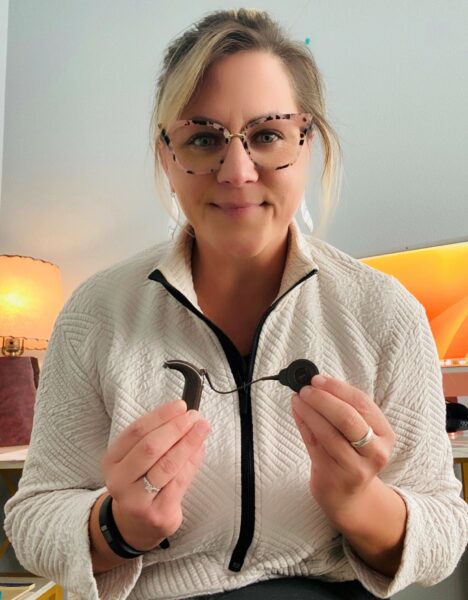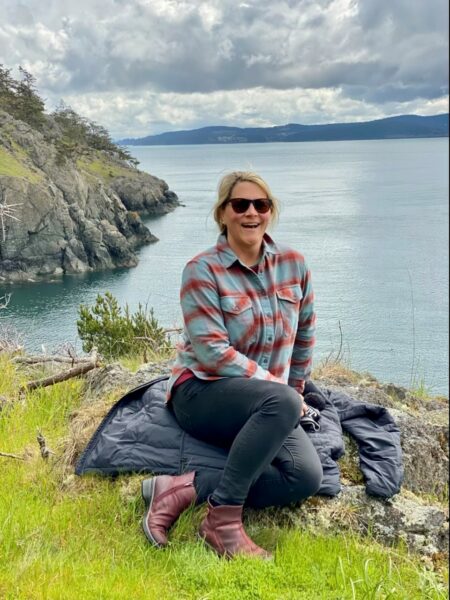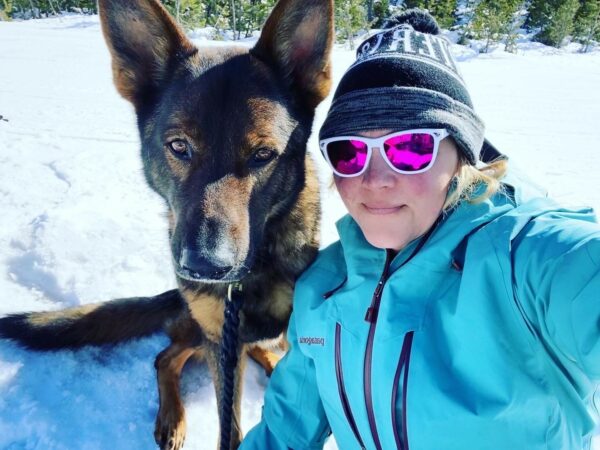Lori tried everything growing up to assist her progressive hearing loss, including learning sign language and wearing hearing aids, unfortunately her hearing continued to worsen. When she was identified as a cochlear implant candidate, her life changed. Now a bilateral cochlear implant recipient, she is able to continue her writing passions and be the best version of herself. Read more:
“My life is split into two halves: before and after 2012, when I got my first cochlear implant at 32. I was born with a severe-profound hearing loss and always struggled to hear. However, I still performed well in my classes and attended a mainstream school – I was the only kid who wore hearing aids. Because my hearing loss was progressive, it just got worse and worse.
Education and hearing loss
 In grade school, I started to learn American Sign Language (ASL), slowly becoming immersed in Deaf Culture. But I was caught between two worlds – Deaf and hearing – and I didn’t fit in with either.
In grade school, I started to learn American Sign Language (ASL), slowly becoming immersed in Deaf Culture. But I was caught between two worlds – Deaf and hearing – and I didn’t fit in with either.
I got my undergraduate and graduate degrees in Creative Writing before getting implanted. I barely got by whenever I went to a book signing, a poetry reading, a lecture, or a writers’ conference. Classroom and public accommodations were tricky because I needed to figure out which worked best – an ASL interpreter, a notetaker, or a stenographer who used a typewriter like the ones seen in courtrooms. With a hodgepodge of options, it needed to be more streamlined. There are far more options these days but my generation was still working out the kinks of assistive technology for the Deaf and Hard of Hearing.
One of the most critical classes for my degree was writing workshops, where we turned in our creative works and discussed them in small groups. While volume wasn’t quite the issue, clarity could always have been better during these discussions. So many times, I could not fully hear what was being said, and I was still learning to be a self-advocate for my disability.
The impact of a cochlear implant on my life
 I’m now 42, with bilateral cochlear implants and my only regret is not getting the surgery done sooner. I was never told I was a candidate for the surgery, I knew very little about it and it would have helped me enormously, given how hard I struggled in college and at work. For that reason, the decision was easy and I wanted the surgery as soon as I learned about it.
I’m now 42, with bilateral cochlear implants and my only regret is not getting the surgery done sooner. I was never told I was a candidate for the surgery, I knew very little about it and it would have helped me enormously, given how hard I struggled in college and at work. For that reason, the decision was easy and I wanted the surgery as soon as I learned about it.
During the pandemic and thanks to my husband’s encouragement, I decided to get back into writing. I was a seasoned cochlear implant user and online classes were becoming increasingly popular as we stayed indoors, battled out the virus and did Zoom®1 calls for work. I signed up for a class at Gotham Writers Workshop based in NYC. Before I knew it, I was sitting in my home office talking to other writers over a Zoom meeting and I could hear for the first time in my life. I could hear feedback on my writing, their thoughts on a recent New York Times®2 article or a fantastic memoir–whatever came up in our class discussion – close to 100%. I could participate in the discussions at my highest level. I’d always loved literary criticism and enjoyed the art of conversation but could never follow along, so my implant has enabled me to be the best version of myself.
After that first online class, a group of us decided to start our own writers’ group, and we have now been meeting every Monday for a year. Technology has advanced so rapidly that I could also use my smartphone for an ASL interpreter over video or turn on live captions – but I now have the option to hear firsthand. Having the ability to hear during my weekly writers’ group has opened doors to friendship, connections and all kinds of experiences from which I was previously cut off.
Taking advantage of the cochlear implant perks
 Another perk to having cochlear implants is that I’ve also been able to rest my eyes and let my ears do the reading since I can stream3 books and podcasts directly to my Cochlear™ Nucleus® 7 Sound Processors. I grew up never being able to hear the radio, listen to a book on tape – or anything without captions.
Another perk to having cochlear implants is that I’ve also been able to rest my eyes and let my ears do the reading since I can stream3 books and podcasts directly to my Cochlear™ Nucleus® 7 Sound Processors. I grew up never being able to hear the radio, listen to a book on tape – or anything without captions.
I’ve had remarkable results and feel in many ways like I want to start all over and do everything a second time, so I can genuinely hear along the way.
Being able to experience all the angles of your passion is a thrill. It still feels new to me sometimes but it’s allowed me to be braver and more confident in my creative endeavors. Writing can be solitary and splendid for a recluse but I’ve always longed for the social aspect – literary schmoozing and networking. Finally, I am 100% there, whether online or in person and I’m excited to explore all the side passions along the way – nothing is holding me back now.”
If you are living with progressive hearing loss, a cochlear implant may help you! Check out our website today.
- Copyright ©2023 Zoom Video Communications, Inc. All rights reserved.
- © 2023 The New York Times Company
- For a full list of smartphone and app compatible devices, visit: www.cochlear.com/compatibility.